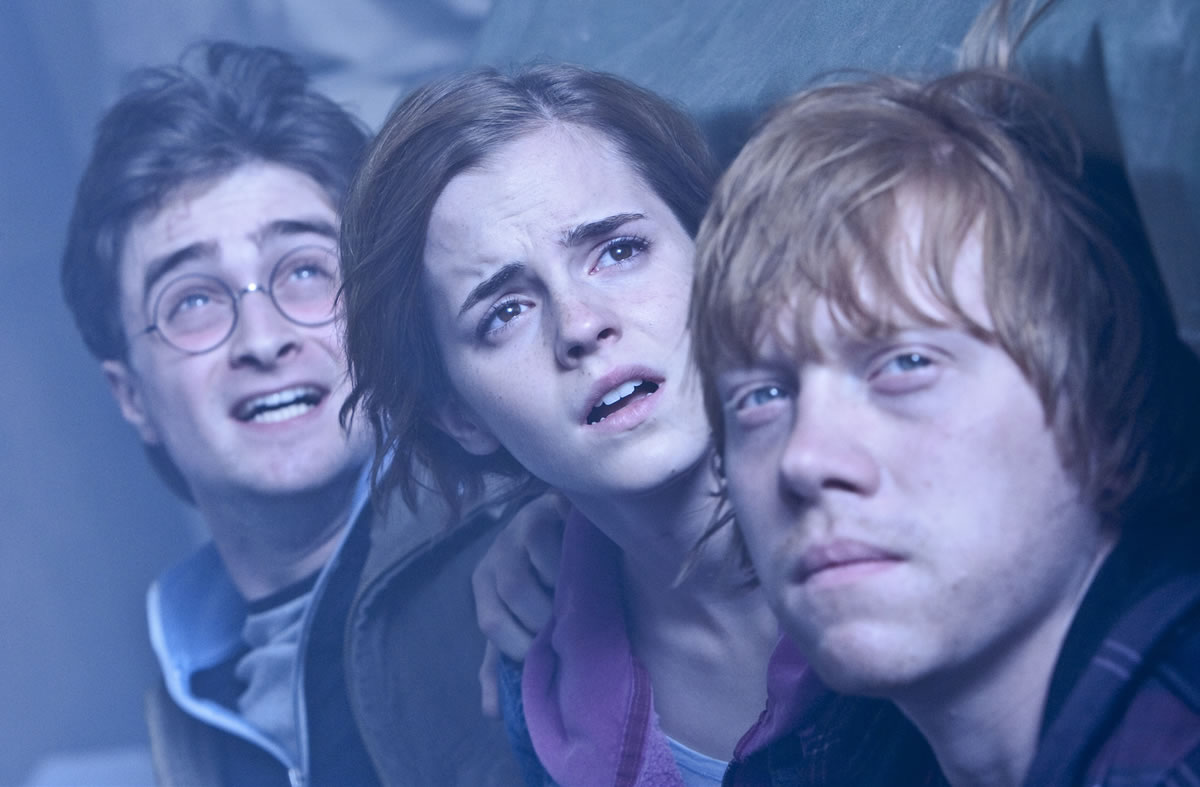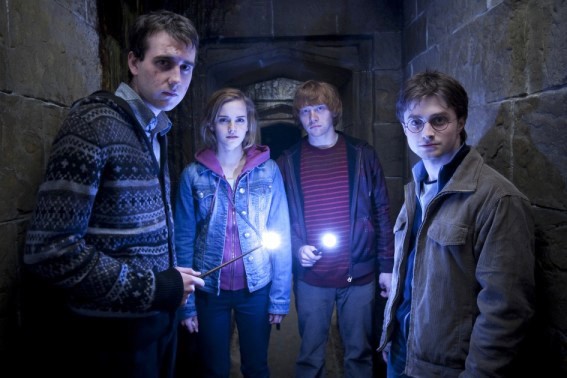
So we come to it at last: the great battle of our age (and one of the many reviews I’m behind on.) And yet, while I don’t much enjoy being a hater in this department — The Leaky Cauldron did start ’round these parts, after all — and while the world clearly disagrees with me anyway (the film is now #3 all-time in box office receipts), I found David Yates’ Harry Potter and the Order of the Phoenix Part II to be a bit underwhelming.
Not to overstate the case: This eighth and final film in the Potter series is a quality production, well-made and well-acted throughout, and it’s still a good deal better than Chris Columbus’ flat first two movies. But it just didn’t resonate with me. Even more than the last film, Hallows Part 2 is stuck with dramatizing some of the clunkiest plot elements in the entire series. (Jesus Harry, anyone? And how ’bout that goofy coda?) And by separating out the story into two movies, Hallows Pt. 2 is bereft of much of the connective tissue that makes the Potterverse so engaging. Honestly, if you told me when the book came out that I’d end up preferring the film about the camping half of Hallows, I never would have believed you.
What do I mean by connective tissue? Well, firstly, the killer app of the Harry Potter series, as Laura Miller argued back in the day, was always Hogwarts, and Book 7 sorely missed the rhythms of boarding school life that infused the first six tomes. That was always an obstacle these last two films would have to overcome, and I thought Part One actually did a good job of it. But, as it turns out, the emotional failsafe — especially for the films, where we’ve really seen these kids grow up — was the interactions among the Big Three. And, now that Hallows has been sliced in half, Harry, Ron, and Hermione really don’t have all that much to do with each other here in the back end.
Instead, we have — after a brief adventure in the vaults of Gringotts — the Siege of Hogwarts, which takes up most of the picture. And it’s all very impressive, with its psychic shields, stone soldiers, rampaging ogres and whatnot. But this is all action-fantasy spectacle, and — after Helms Deep, Minas Tirith, and various other besieged redoubts in recent cinema, not particularly engaging spectacle at that. (Also, I guess the idea here is the good guys are buying time for Harry to find the Ravenclaw diadem, but the way the story comes across, all this carnage seems beside the point anyway. Couldn’t all the loss of life have been averted if Snape just took Harry by the pensieve before the Big Battle?)
Speaking of ole Severus, the back half of the film is also burdened by its source material. To be honest, I’d forgotten about many of the things that aggravated me about Deathly Hallows the book, until the story unfolded here once again. I already mentioned the Aslanification of Harry, where he has to now sacrifice himself for Voldemort’s sins to be truly expunged from this world. (See also: Matrix: Revolutions.) Then there’s the conversations with ghosts and the heavenly train depot rendez-vous with Dumbledore (weirdly, also in the third Matrix.)
And then there’s the Snape story, which plays out mostly as expected, but still has the effect of totally cheapening the character of Harry’s real dad. (As it is here, Snape is the unrequited hero, and James Potter is just a bullying prat who happened to marry Lily.) Like I said, a lot of these plot developments seemed to be coming by the end of the series — Severus always seemed like he was deep undercover, and Harry’s lightning scar made sense as the seventh horcrux. But the execution in the book, and subsequently here in the movie, is clumsy.
One more small issue here: Along with Hogwarts itself and the Big Three, the third leg of the stool for the films has been its British Thespian Full Employment program. But, with the exception of Ralph Fiennes’ Serpenthead Voldemort and arguably Maggie Smith as Professor McGonagall, the amazing collection of talent in the bullpens here doesn’t get all that much to do either. Estimable actors like John Hurt and Jim Broadbent have only reaction shots, and even big moments like the death of David Thewlis’ Lupin and Natalia Tena’s Tonks are given short shrift. (FWIW, the only big new actorly add in this last installment is Ciaran Hinds as Alberforth Dumbedore, but he’s virtually unrecognizable underneath his Michael Gambon makeup.)
Again, not to be a total hater — This is a competently-made and even sleek production, and it’s hard to see how David Yates could’ve improved the situation given the constraints of the source material. But, there’s no riff as inspired here as Yates’ Brazilian reconception of the Ministry of Magic in the last film, nor any sequence as transporting as the animated origins of the Hallows we saw last November. Like the book series from whence it came, the last chapter of the Harry Potter films ends with a bit of a plunk.

